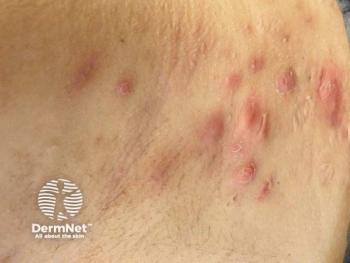
Review Indicates That Conventional GPP Therapies Are Still Widely Used, While Biologic Use is on the Rise in Japan
A recent retrospective cohort study described drug survival and treatment patterns among patients with newly-diagnosed generalized pustular psoriasis.
A recent comprehensive study conducted in Japan shed light on the treatment patterns and outcomes for patients with generalized pustular psoriasis (GPP).
The study employed a retrospective cohort design using a large-scale hospital-based database covering approximately 20% of hospitals in Japan. The data included patient demographics, diagnosis, laboratory tests, procedures, prescriptions, admissions, and discharge information. The study was conducted between January 1, 2016, and August 31, 2021.
The analysis included 434 Japanese patients newly diagnosed with GPP, excluding those with unclear or limited diagnosis information. The baseline period was defined as 1 year before the index date, or the date of initial GPP diagnosis.
First-line therapies included oral medications (e.g., etretinate, cyclosporin), topical medications, and biologics (IL-17 inhibitors, TNF-α inhibitors). Treatment pathways for the first three lines of therapy were illustrated using a Sankey plot, providing a visual representation of the choices made in clinical practice.
The study highlighted common combination patterns of biologics or apheresis/plasma exchange with other systemic medications.
Researchers analyzed median TTNT for various regimens, indicating the duration between different lines of therapy. Combination therapies generally exhibited longer TTNT compared to monotherapies.
Biologics demonstrated longer drug survival with fewer treatment episodes compared to non-biologic systemic medications. Additionally, median drug survival for common biologics (e.g., secukinumab, guselkumab) exceeded that of non-biologic medications (e.g., systemic corticosteroids, etretinate).
Furthermore, treatment switching occurred across all biologic classes, with infliximab and ustekinumab showing higher switching rates. In fact, 15% of patients treated with TNF-α inhibitors and more than 17% treated with IL-17 inhibitors switched to IL-23 inhibitors.
According to researchers, the lack of a discernible treatment algorithm was evident, with choices influenced by physician preference and patient response. First-line therapies often included conventional options like etretinate and cyclosporin, while biologic use increased in subsequent lines. Combination therapies, especially with supplementary drugs, demonstrated longer TTNT.
Biologics showed superior drug survival, supporting their efficacy in GPP management. However, due to the nature of GPP and intermittent flares, these factors may contribute to the relatively short drug survival across all treatments.
Additionally, treatment patterns varied based on the presence of psoriasis vulgaris and patient age. Differences in medication choices reflected varying symptom severity and underlying disease mechanisms, study authors wrote.
"The variable treatment patterns also highlight that there are still considerable unmet needs for effective and well-tolerated GPP treatments that optimally manage GPP throughout the disease course, enabling patients to remain on long-term therapy where necessary," wrote Tada et al. "The identified treatment patterns and drug survival data in patients with GPP could facilitate the optimal management of patients with this disease. Future research could assess the impact of newly adopted treatments (such as bimekizumab, spesolimab, and deucravacitinib) and newly updated guidelines on treatment patterns and drug survival in patients with GPP."
Reference
Tada Y, Guan J, Iwasaki R, Morita A. Treatment patterns and drug survival for generalized pustular psoriasis: A patient journey study using a Japanese claims database. J Dermatol. Published online January 12, 2024. Accessed January 12, 2024.
Newsletter
Like what you’re reading? Subscribe to Dermatology Times for weekly updates on therapies, innovations, and real-world practice tips.










